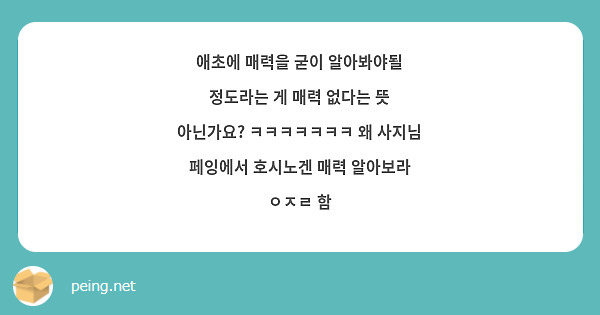굳이 meaning
1. 굳이의 기본적인 의미는 무엇인가?
The basic meaning of 굳이 is “must,” “have to,” or “need to,” which denotes obligation or necessity. It is often used to express someone’s insistence on doing something even though it’s not necessary. For instance, in the sentence “굳이 왜 쇼핑을 해야 해?” (Why do I have to go shopping?), 굳이 emphasizes the speaker’s unwillingness to go shopping, implying that it’s not crucial or that they don’t see the point in doing so.
2. 굳이를 사용하는 방법과 효과에 대해 알아보자.
When used appropriately, 굳이 can be a powerful tool to express one’s thoughts and feelings with conviction. Since it denotes a level of insistence or necessity, it can add emphasis and conviction to the speaker’s words. Moreover, it can convey a sense of defiance or resistance when used in situations where someone disagrees with another’s suggestion or request. Additionally, 굳이 can also express a tone of reluctance or reluctance, especially when paired with a verb such as 해야 하다 (have to do), 부탁하다 (ask for a favor), or 하기 싫다 (don’t want to do).
3. 굳이는 인상 깊은 감정 표현에 굉장히 적합한 표현이다.
Due to its assertive and emphatic nature, 굳이 can be effective in conveying strong emotions such as frustration, annoyance, or anger. For instance, when someone keeps persisting on an issue that the speaker doesn’t want to address, they can say, “굳이 그런 얘기를 하지 마세요!” (Don’t keep bringing that up!”) to express their annoyance forcefully. In this way, 굳이 can be used to express one’s limits and boundaries and assert oneself in a conversation or argument.
4. 굳이를 사용하는 상황과 문맥에 대한 이해가 필요하다.
While 굳이 has various uses, it is crucial to use it in appropriate situations and context. Overusing or misusing 굳이 can create confusion or misunderstandings, and it may come off as rude or insensitive. For instance, using 굳이 when asking for a favor may come off as ungrateful or demanding, depending on how it’s used. So, it’s essential to understand the situation and judge whether 굳이 is suitable or not before using it.
5. 굳이와 같은 감정 표현으로는 어떤 것들이 있을까?
Korean, like any other language, has a wide variety of expressions to convey emotions effectively. Other similar expressions to 굳이 in Korean can include “구지” (gu-ji), which has a similar meaning of “need to,” “have to,” or “must,” and “또래” (to-rae), which denotes peer pressure or social norms. Furthermore, depending on the context and emotion, other words such as “극도로” (geuk-do-ro) or “너무나도” (neomu-na-do) can emphasize the speaker’s feelings even further.
6. 굳이의 뉘앙스를 파악해 보자.
In addition to its basic meaning, 굳이 has various nuances depending on its context. Understanding these nuances can help learners and speakers convey their message more effectively. For instance, using 굳이 in a cooperative tone can convey a sense of openness and compromise rather than in a confrontational tone. Additionally, using 굳이 with a tone of resignation or reluctance can express the speaker’s humility and acknowledgment of their responsibilities.
7. 굳이를 사용하는 것이 야기할 수 있는 오해와 함정들.
As with any language, using 굳이 incorrectly or overusing it can lead to misunderstandings or come off as rude or insensitive. Therefore, it’s essential to use it in the appropriate context and tone and understand its connotations before using it. Additionally, another caveat is that the same word may have different meanings or connotations depending on the speaker’s regional dialect or background. Therefore, it’s crucial to consider the audience and their background before using 굳이.
8. 차이나는 관점에서 본 굳이의 의미.
As Korean becomes more globally prevalent and the student body more diverse, understanding the nuances of words such as 굳이 becomes increasingly crucial. For example, depending on the speaker’s background and regional dialect, 굳이 may have different meanings or connotations. Therefore, it’s essential to understand 굳이’s various uses and different connotations to communicate effectively and avoid potential misunderstandings.
9. 사회언어학적인 관점에서 굳이의 사용에 대해 알아보기.
From a sociolinguistic perspective, words such as 굳이 can reveal the speaker’s social status, background, and level of education. Additionally, using certain words or expressions inappropriately can lead to judgments about the speaker’s intelligence or social skills. Therefore, it’s crucial to understand the social context and audience when using words such as 굳이 to communicate effectively.
FAQs:
Q: What is the difference between 굳이 and 구지?
A: 굳이 and 구지 have the same meaning of “must,” “have to,” or “need to.” However, 굳이 denotes an insistent tone, while 구지 implies a sense of wanting or a personal preference and is less assertive.
Q: What does 굳 mean?
A: 굳 is the stem form of the verb 굳다 (to harden), and it means firm or solid.
Q: What does 구지 mean?
A: 구지 also means “must,” “need to,” or “have to,” but it implies a sense of personal preference or desire rather than a strict obligation.
Q: Can Google Translate be trusted for translating 굳이 meaning?
A: While Google Translate does provide a translation for 굳이, it doesn’t always consider context and nuance, which can lead to inaccurate or confusing translations. Therefore, it’s recommended to consult with a native speaker or language resource before relying on machine translation alone.
In conclusion, the word 굳이 in the Korean language has various uses and meanings depending on its context and tone. While it can effectively convey assertiveness and emotions, it’s essential to use it appropriately to avoid misunderstandings or coming off as insensitive. By understanding its nuances and connotations, learners and speakers can communicate more effectively and better connect with native speakers of Korean.
사용자가 검색한 키워드: 굳이 meaning 굳이 왜, 굳이 구지, 굳 meaning, 구지 뜻, Google Translate
Categories: Top 13 굳이 meaning
굳이 (Live)
여기에서 자세히 보기: chinhphucnang.com
굳이 왜
Meaning and Usage
The phrase “굳이 왜” is made up of two parts. “굳이” means “necessarily” or “needlessly” and “왜” means “why”. When used together, the phrase expresses a feeling of reluctance or doubt towards a particular action or task. It’s often used to question why someone is doing something, especially if it’s something that the speaker thinks is unnecessary or pointless.
For example, if someone told you that they were going to buy a brand new car even though their current car is perfectly fine, you might respond with “굳이 왜?” to express your confusion or skepticism. Similarly, if a friend asked you to come with them to a party, but you weren’t in the mood to socialize, you might say “굳이 왜 가야 해?” which roughly translates to “Why do I have to go?”
One of the reasons why “굳이 왜” is so commonly used in Korean is because it provides a way for people to express their opinions and preferences without being too direct or confrontational. In a culture that values harmony and avoiding conflict, phrases like “굳이 왜” can be seen as a polite way of disagreeing with someone or expressing dissatisfaction.
Another important point to note is that the tone and context in which the phrase is used can greatly impact its meaning and level of politeness. For example, if you use “굳이 왜” in a sarcastic or dismissive tone, it may come across as rude or disrespectful. On the other hand, if you use it in a calm and measured tone, it may be seen as a genuine question or expression of concern.
FAQs
Q: Can “굳이 왜” only be used in negative situations?
A: Not necessarily. While the phrase is often used to express reluctance or disagreement, it’s not always negative. For example, if someone is being overly cautious or meticulous about something, you might ask “굳이 왜?” in a curious or amused way. In this context, the phrase is being used to express interest or curiosity rather than doubt or skepticism.
Q: Is it impolite to use “굳이 왜” when disagreeing with someone?
A: It depends on the tone and context in which the phrase is used. If you use it in a confrontational or sarcastic way, it may come across as rude or disrespectful. However, if you use it in a calm and polite manner, it can be a way of expressing your views or preferences without causing offense.
Q: Can “굳이 왜” be used in formal situations?
A: While the phrase is generally seen as informal or casual, it can be used in formal settings depending on the situation and the relationship between the speakers. For example, if a subordinate is questioning a decision made by their boss, they might use “굳이 왜” to express their concerns in a respectful manner.
Q: Are there any similar phrases in English?
A: Yes, there are several phrases in English that have similar meanings to “굳이 왜”. Some examples include “What’s the point?”, “Why bother?”, and “Why go through all the trouble?”
Q: Can “굳이 왜” be used to express frustration or annoyance?
A: While the phrase is generally used to express reluctance or doubt, it can also be used to express frustration or annoyance in certain contexts. For example, if someone keeps asking you the same question repeatedly, you might say “굳이 왜 그렇게 물어봐?” which roughly translates to “Why do you keep asking the same thing?”
Conclusion
In Korean, “굳이 왜” is a versatile and commonly used phrase that’s often used to express reluctance or doubt towards a particular action or task. Depending on the context and tone in which it’s used, it can be a way of expressing disagreement, curiosity, or even frustration. Whether you’re a Korean language learner or simply interested in exploring the nuances of Korean culture, understanding the meaning and usage of “굳이 왜” can be a valuable insight into the language and mindset of Korean speakers.
굳이 구지
History and Usage of 굳이 구지
The phrase 굳이 구지 has a long-standing history in the Korean language. It is a combination of two words. 굳이 is derived from the Chinese character “固” which means “strong,” “hard,” or “firm.” 구지 is derived from another Chinese character “求” which means “to seek” or “to demand.” These two words together create a phrase that implies a sense of demand or stubbornness.
The usage of 굳이 구지 is typically negative. It is a critical phrase used to express the speaker’s irritation or annoyance towards a particular action, remark, or situation. The context of using this phrase can vary, depending on the situation. For example, if someone has done something that is unnecessary, then the speaker may use this phrase to express their dissatisfaction. They might say something like, “Why did you 굳이 구지 do that?”.
While the phrase 굳이 구지 is used in the negative sense, it is used with the intention of conveying a message or point. The speaker wants the person they are addressing to understand that their action was unnecessary or even unpleasant.
Various Usages of 굳이 구지
1. To interrupt someone unnecessarily
In Korean culture, it is considered impolite to interject or speak out during another person’s speech or conversation. In such situations, if someone interrupts without any apparent reason or without any helpful information afterwards, we would say that this person 굳이 구지 interrupted the other person unnecessarily. This usage highlights the negative connotation of 굳이 구지.
2. To demand too much or excessively
In Korean society, people usually expect others to fulfill their duties and responsibilities rightfully. In some cases, people may ask for more than what is appropriate or expected. In such situations, we would say that the person 굳이 구지 demanded more than what was necessary or reasonable.
3. To make excessive or unnecessary remarks
In conversations, some people tend to make excessive or unnecessary remarks. Sometimes, people ramble or talk about irrelevant things, which can be tedious for others to listen to. In such situations, 굳이 구지 is used to point out that the comments made were unnecessary or excessive.
4. To insist on something
Koreans are typically humble and are known for avoiding confrontation. However, there are times when people have to assert themselves and make their point clear. Sometimes, when one person insists on something that is not entirely necessary, we would say that they 굳이 구지 insisted on it.
5. To do something that is not essential or relevant
In everyday life, people tend to compete for success and recognition. Sometimes, people may do something that is not essential or relevant to achieving their goals. In such situations, we might say that someone 굳이 구지 did something that was unessential or unnecessary, highlighting the person’s less than optimal action.
FAQs
1. Is 굳이 구지 used in formal situations?
The phrase 굳이 구지 is typically used in casual conversations and is not commonly used in formal contexts. While it is a critical phrase, it is not appropriate to use it in serious or official conversations. It is recommended to use this phrase cautiously, even in casual conversations, as it can sound rude or confrontational if not used in the right context or tone.
2. Can 굳이 구지 be used positively?
It is rare to use 굳이 구지 in a positive context. 굳이 구지 is a negative phrase that is often used to criticize or scrutinize someone’s actions. It is not used as the primary phrase to commend or acknowledge someone’s action positively. Instead, other phrases or expressions are used to compliment someone.
3. Can 굳이 구지 be used with different words?
Yes, 굳이 구지 can be used with different words or expressions to express the same type of dissatisfaction or irritation. However, the different words or expressions may have different nuances or tones. Thus, the context in which they are used may vary depending on situational context and speaker’s tone.
4. What does it mean when someone uses 굳이 구지 frequently?
If someone frequently uses 굳이 구지 in their conversations, it implies that they are critical or intolerant of other people’s actions or statements. This may hint at their irritation, frustration, or dissatisfaction with their surroundings. In some cases, using 굳이 구지 frequently may be perceived negatively, as it may paint the image of the speaker as someone who is hard to please.
In conclusion, 굳이 구지 is a common and recognizable phrase in the Korean language. It is a versatile phrase that can be used to express a diverse array of negative emotions such as irritation, frustration, or dissatisfaction. While it is a critical phrase, people should use it appropriately and careful tone as it can sound rude or confrontational if used inappropriately. Understanding this phrase’s historical roots, the different situations it can be used, and how people perceive it is essential to communicating effectively in Korean.
주제와 관련된 이미지 굳이 meaning

굳이 meaning 주제와 관련된 이미지 33개를 찾았습니다.
![굳이 뜻: 단단한 마음으로 굳게., 고집을 부려 구태여. [국어 사전] 굳이 뜻: 단단한 마음으로 굳게., 고집을 부려 구태여. [국어 사전]](https://thx.sfo2.cdn.digitaloceanspaces.com/wr/coverimages/m_11/%EA%B5%B3%EC%9D%B4_11.jpg)





Article link: 굳이 meaning.
주제에 대해 자세히 알아보기 굳이 meaning.
- Perfect Explanations for 굳이 Meaning in Korean
- What is the meaning of 굳이 and when/how to use it? : r/Korean
- what does 굳이 means? – italki
- STUDY KOREAN — 굳이 meaning + examples
- 굳이 (gud-i) Meaning in English – English Translation – Tr-ex
- 굳이 meaning in English
- 굳이 (Korean): meaning, translation – WordSense Dictionary
더보기: https://chinhphucnang.com/blogko/